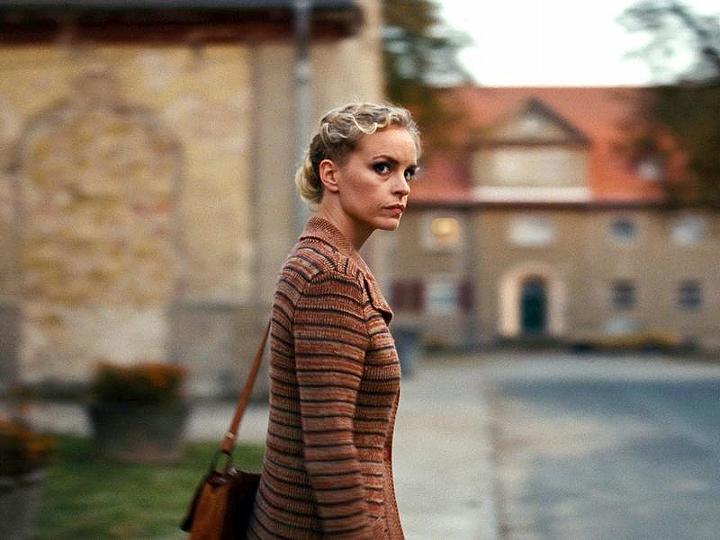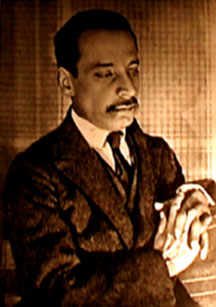A short story ("In our synagogue") by this German-language writer. You can read the original as part of this collection.
 In our synagogue lives an animal roughly the size of a marten. It can often be quite clearly observed and it tolerates human proximity at a distance of about two meters. Its color is a light bluish-green. No one has ever stroked its fur, so little can be said in that regard; one might even claim that the fur's natural color is unknown. Perhaps its visible color comes from accumulated dust and grout, since the color also resembles the plaster work of the synagogue's interior, only a bit lighter. Apart from its timorousness, it is an immensely calm and sedentary beast. If it did not get roused quite so often, it would hardly change position at all.
In our synagogue lives an animal roughly the size of a marten. It can often be quite clearly observed and it tolerates human proximity at a distance of about two meters. Its color is a light bluish-green. No one has ever stroked its fur, so little can be said in that regard; one might even claim that the fur's natural color is unknown. Perhaps its visible color comes from accumulated dust and grout, since the color also resembles the plaster work of the synagogue's interior, only a bit lighter. Apart from its timorousness, it is an immensely calm and sedentary beast. If it did not get roused quite so often, it would hardly change position at all.
Its favorite place to stay is near the grates to the women's section. With visible pleasure it crawls into the grates' mesh, stretches itself out, and casts its gaze down towards the prayer area. Such an audacious position seems to please the animal, yet the temple's maintenance worker is commissioned to make sure the animal is never on the grates because it would soon accustom itself to this place, which we cannot allow because of the women who are afraid of the animal. Why they are afraid of it, however, remains unclear. Admittedly, it looks rather scary upon first sight: one may find the long neck, triangular face, almost horizontally-protruding upper teeth, and the seemingly hard, light kemp-hair protruding past the teeth, a row longer than the upper lip, particularly frightening. Nevertheless, we are soon forced to conclude how obviously harmless this whole scary business is. First and foremost, the animal stays away from humans; it is shier than a forest animal, and this seems to have nothing to do with the building. In fact, its personal misfortune consists of the fact that this building is a synagogue, which means it is occasionally a very bustling and lively place. If one were able to communicate with the animal, one could at least comfort it by mentioning that our community is getting smaller and smaller with every passing year and is already struggling to secure enough money to maintain the synagogue. One cannot rule out the possibility that sooner or later a silo or something of that nature will be made out of this synagogue, and the animal will get the peace and quiet it so sorely lacks.
It is in any case only the women who fear the animal, as the men have long since grown indifferent to it: one generation showed it to the other; again and again was it seen; and in the end, one no longer looked in its direction. Even children seeing it for the first time are no longer amazed. It has become the pet of the synagogue, and why shouldn't the synagogue have its own, unexampled pet? Were it not for the women one would hardly know of the animal's existence. Yet even the women are not really afraid of it; it would be too odd to fear such an animal, day in and day out, for years and decades. They defend their position, however, by saying that the animal is much closer to them than to the men, and this is true. The animal does not dare approach the men; no one has ever even seen it on the floor. If one didn't let it near the grates to the women's section, it would still settle at an equivalent height on the opposite wall. There one finds, hardly the width of two fingers, a narrow ledge circling three sides of the synagogue. On this ledge the animal sometimes scampers here and there; most of all, however, it sits calmly in a specific spot across from the women. It is almost inconceivable how easily it can make use of this narrow path, and the way in which it turns back around once it has reached one of the ends of the ledge is well worth seeing. It is, after all, a very old animal, yet it does not hesitate to take the most daring leaps and, what is more, it also never fails. It spins in midair then goes back the other way. Nevertheless, when one has seen this several times one is sated and no longer has any incentive to keep staring.
It is also neither fear nor curiosity that keeps the women moving; if they stuck to their brooms a bit more they would completely forget about the animal. The pious women would do the same if the others, who happen to comprise the majority, allowed it; these others, however, like drawing attention to themselves and the animal for them is simply a welcome excuse. If they could and if they dared, they would certainly have lured the animal closer to themselves just to be able to get more frightened. But in reality the animal does not approach them at all; when it is not attacked it is as unconcerned about the women as it is about the men. It would probably prefer to remain hidden, in those places it inhabits when there are no services, in all likelihood in some hole in the wall that we have yet to discover. Only when one begins to pray does it appear, frightened by all the noise, wishing to see what has happened, wishing to remain awake, wishing to be free, able to escape, running before us out of fear, making its little capers out of fear, and not daring to retreat until the services are over. It prefers heights, of course, because there does it feel safest, and the grates and ledge offer the best opportunities to flee. Yet in no way does it stay there all the time; sometimes it climbs down, closer to the men. The curtain of the ark of the covenant is borne by a shiny brass rod that seems to attract the animal; often enough it creeps down to it but always sits there calmly. Not even when it is right beside the ark of the covenant can one say that it disturbs us, its blank, always open, perhaps even lidless eyes seem to take in the community members, without, of course, looking at anyone in particular. Instead it only stares at the dangers from which it feels threatened.
In this regard it has seemed not much more comprehensible than our women, at least until recently. What dangers does it have to fear? Who has any intention of doing anything to it? Hasn't it been left utterly to its own devices for many years? The men do not worry about its presence and the majority of the women would likely be unhappy if it were to disappear. And since it is the lone animal in the building, it also has no enemies. It should have very nearly been able to detect this fact from all its years here. And although the services and their noise may be frightening for the animal, they occur every day in such modest intervals, somewhat more often during holidays, with such regularity and always without interruption, that even the most craven of beasts would have long since grown accustomed to such services, especially when it sees they comprise not the noise of persecutors, but that which has nothing at all to do with the animal. And yet this fear. Is it the memory of things long past or the premonition of days to come? Does this old animal perhaps know more than the three generations gathered at any one time in the synagogue?
Many years ago, it is said, one would have really tried to banish the animal. This may well be true; more likely is that we are merely dealing with invented stories. What we can show, however, is that the religious point of view, that is to say, whether one should tolerate such an animal in a house of worship, was investigated at the time. The attestations of various well-known rabbis were collected, and the views were split: the majority wanted the animal's expulsion and a new consecration of the house of worship. But this was easy to declaim from a distance. In reality, of course, it was impossible to drive out the animal.
 Saturday, December 5, 2015 at 02:58
Saturday, December 5, 2015 at 02:58  Two paths exist, but neither ends.
Two paths exist, but neither ends. 




